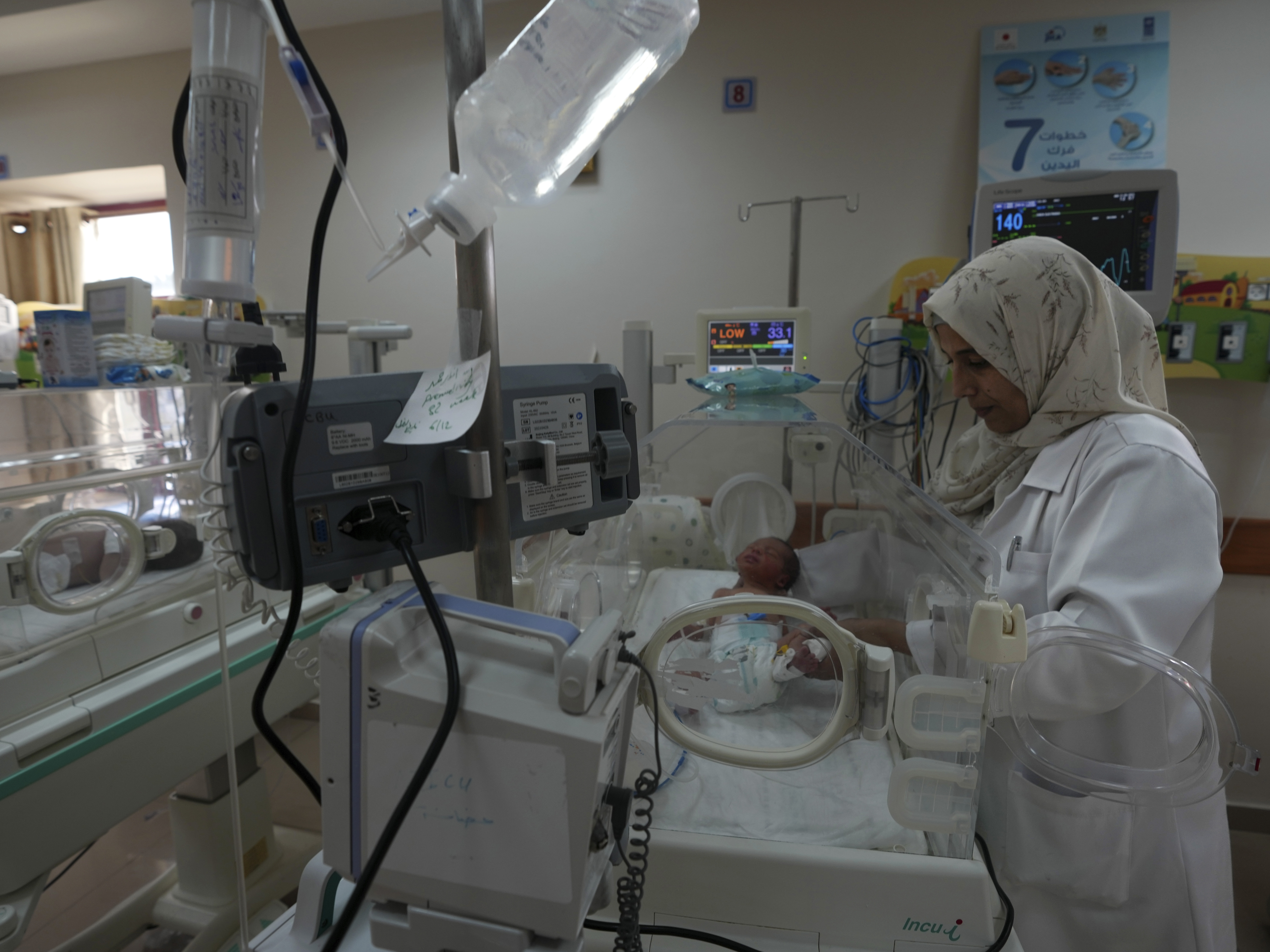
A Palestinian doctor treats a prematurely born baby at Al Aqsa Hospital in Gaza on Sunday, Dec. 10, 2023.
Adel Hana / AP
Just over a week after the fragile truce between Israel and Hamas collapsed, the World Health Organization's executive board adopted a resolution in a special session on Sunday to protect health care in Gaza and seek the unfettered movement of humanitarian and medical assistance.
The resolution, which was adopted without objection, also called for funding to support WHO's efforts in the Palestinian territories.
"I think we all agree that this is a meeting we would rather not be having," said WHO Director-General Tedros Adhanom Ghebreyesus in his opening address.
The adoption of the resolution came after a full day of speeches about the deteriorating health situation in Gaza from representatives of dozens of countries. While the U.S. tried to distance itself from certain elements of the resolution, including language around calls for a cease-fire, it did not attempt to block it.
During remarks made early in the day, Meirav Eilon Shahar, Israel's permanent representative to the United Nations in Geneva, said "Today's session is the only session ever convened here in Geneva on a specific conflict," pointing to the wars in Syria, Yemen, and Sudan. "Do the victims of those conflicts matter less, or does the world play by a different rulebook when it comes to Israel?"
Related: Gaza cease-fire with Hamas extended another day as Blinken arrives in Israel
Shahar concluded that there are different rules for Israel, but ultimately didn't stand in the way of the resolution's adoption.
Some countries condemned Hamas' attack on Israel on Oct. 7 that killed around 1,200 people and resulted in some 240 hostages being taken into Gaza, according to Israeli authorities. Still, those nations that had asked to hold Sunday's meeting explained their request came out of growing alarm over the deepening humanitarian crisis in Gaza.
WHO estimates more than 17,000 Palestinians have lost their lives since the war began, including at least 7,700 children. In addition, the global health body reports 1.95 million people have been internally displaced. Humanitarian organizations warn that the trickle of aid entering Gaza since the conflict began is staggeringly insufficient to meet the enormous need.
Dr. Mai al-Kaila, Minister of Health for the Palestinian Authority, underscored that concern in her remarks.
"The daily horrors we all witness defy international law and shatter the very sense of our shared humanity," she said.
Related: Israel’s war with Hamas resumes with airstrikes in Gaza after a weeklong truce ends
WHO quantified the impact the war has had on medical infrastructure, citing at least 449 attacks on health care in Gaza and the West Bank and 60 in Israel since the conflict began slightly more than two months ago. Of the 36 hospitals previously operating in the enclave, only 13 are currently partially functional. This diminished capacity comes at a time of overwhelming medical demand, due to both the conflict and everyday health needs. For instance, WHO said that more than 180 women are giving birth in Gaza each day.
The Indonesian delegation expressed regret that the United Nations Security Council's vote for a cease-fire failed on Friday when the U.S. vetoed it. China, Lebanon, Turkey, Belgium and Cuba were among the countries that spoke in favor of a cease-fire at Sunday's gathering. The delegation of Barbados stressed that health is a human right, one that was in part established 75 years ago Sunday when the Universal Declaration of Human Rights was signed.
Related: Israel hits targets in Gaza as its cease-fire with Hamas collapses
Once the resolution was adopted at the end of the day, there was sustained applause. Tedros complimented those who had gathered for achieving a milestone — "the first consensus resolution on the conflict... since it began two months ago."
He expressed his commitment to follow through on what the resolution asks of him and WHO, but acknowledged that "sustained humanitarian assistance at the scale needed is simply not possible without a cease-fire."
Still, he said, it's a solid platform from which to build, using "health as a bridge to peace."
Copyright 2023 NPR. To see more, visit https://www.npr.org.
